





Sign up for free business risk news by clicking on button an following us via your preferred social media account or email editor@businessrisktv.com to subscribe for free to our business risk newsletter
Improving healthcare and businesses in healthcare
Healthcare business news magazine. Healthcare risk consulting reviews. Exploring the future of health and healthcare locally and globally. Improve the healthcare business and outcomes for patients. Create healthcare business value. Mitigate the biggest threats to your healthcare business. Seize new business opportunities.
Sign up to free BusinessRiskTV business risk newsletter editor@businessrisktv.com
Hundreds of UK Pharmacies Closing Down in 2023
The UK pharmacy sector is facing a number of challenges, leading to the closure of hundreds of pharmacies in 2023. These challenges include rising operational costs, staff shortages, and reduced government financial support.
Rising Operational Costs
One of the biggest challenges facing pharmacies is the rising cost of doing business. This includes the cost of rent, utilities, and medicines. The cost of medicines has been increasing in recent years, due to a number of factors, including the rising cost of manufacturing and the increasing complexity of new medicines.
Staff Shortages
Another major challenge facing pharmacies is the shortage of pharmacists. The number of pharmacists in the UK has been declining in recent years, due to a number of factors, including the retirement of older pharmacists and the lack of new graduates entering the profession. This shortage is putting a strain on pharmacies, as they are forced to work with fewer staff.
Reduced Government Financial Support
The government provides financial support to pharmacies through the NHS pharmacy contract. However, this contract has not been updated in recent years, and it no longer reflects the rising costs of doing business. This means that pharmacies are facing financial challenges, as they are not receiving enough funding to cover their costs.
Impact of Closures
The closure of pharmacies has a number of negative impacts on patients and the wider community. Patients may have to travel further to get their prescriptions, and they may have difficulty accessing other pharmacy services, such as vaccinations and blood pressure checks. The closure of pharmacies can also lead to increased pressure on GPs and A&E departments, as patients who would normally go to the pharmacy for minor ailments may instead go to these services.
What Can Be Done?
There are a number of things that can be done to address the challenges facing the UK pharmacy sector and prevent further closures. These include:
- Increasing government funding for pharmacies.
- Revising the NHS pharmacy contract to reflect the rising costs of doing business.
- Addressing the shortage of pharmacists by increasing the number of graduates entering the profession.
- Supporting pharmacists to work more efficiently.
The closure of pharmacies is a serious issue that needs to be addressed. By taking steps to address the challenges facing the sector, we can help to ensure that pharmacies remain a vital part of the UK healthcare system.
In addition to the challenges mentioned above, there are a number of other factors that may contribute to the closure of pharmacies in the UK. These include:
- The increasing popularity of online pharmacy services.
- The growth of supermarkets and convenience stores, which are increasingly offering pharmacy services.
- The changing demographics of the UK population, with an aging population that is more likely to use pharmacy services.
The closure of pharmacies is a complex issue with no easy solutions. However, by understanding the challenges facing the sector and taking steps to address them, we can help to ensure that pharmacies remain a vital part of the UK healthcare system.
Bed Blocking Causes and Solutions UK
Bed blocking, also known as “bed occupancy,” occurs when a patient is medically fit to leave the hospital but is unable to be discharged due to a lack of appropriate care or support in the community. This issue is a major problem in the NHS, as it leads to overcrowding in hospitals and prevents other patients from receiving the care they need.
There are several factors that contribute to bed blocking in the NHS. One of the main causes is a lack of social care services in the community. When patients are discharged from the hospital, they may require additional support in order to fully recover, such as assistance with daily activities or help managing a chronic condition. Without these services, patients may be unable to leave the hospital and must remain there until they can be properly cared for.
Another major cause of bed blocking is a shortage of suitable housing for patients. Some patients, particularly older adults and those with disabilities, may require specialised accommodation in order to be safely discharged from the hospital. Without this housing, patients may be unable to leave the hospital and may become trapped in a cycle of hospitalisation.
It is now clear that vaccines did not and do not stop the transmission of the virus. Unvaccinated care workers did not threaten people in care. Indeed, there is evidence that unvaccinated people who contracted virus are least likely to get reinfected with virus so will be less likely to be off work. Mandating care workers to get the vaccine or leave job resulted in some 40000 care workers leaving the profession. This is a huge cause of bed blocking in NHS. It was a mistake that can easily be corrected including compensating care workers for bad public health policy and practices.
Other factors that contribute to bed blocking include a lack of coordination between health and social care services, delays in completing assessments for patients, and a lack of appropriate care and support for patients with complex needs.
To relieve pressure from bed blocking in the UK, there are several steps that can be taken.
- Increase funding for social care services in the community: By providing more funding for social care services, patients will have access to the support they need after leaving the hospital, allowing them to fully recover and reduce the number of patients who are stuck in the hospital.
- Improve coordination between health and social care services: By better coordinating between health and social care services, patients will be able to receive the care they need in a more timely and efficient manner, reducing the likelihood of bed blocking.
- Compensate care workers for mandated vaccination policy and re-recruit thousands of care workers to reduce bed blocking in NHS.
- Increase the availability of suitable housing for patients: By increasing the availability of specialised accommodation, patients will be able to leave the hospital and receive the appropriate care they need in the community.
- Speed up the assessment process: By speeding up the assessment process, patients will be able to receive the care they need faster and reduce the likelihood of bed blocking.
- Prioritise care and support for patients with complex needs: By prioritising care and support for patients with complex needs, patients will be able to receive the care they need and be more likely to leave the hospital.
In conclusion, bed blocking is a major problem in the NHS that contributes to overcrowding in hospitals and prevents other patients from receiving the care they need. By increasing funding for social care services, improving coordination between health and social care services, re-recruit care workers after they have been compensated for poor public health policy that forced them out of jobs, increasing the availability of suitable housing, speeding up the assessment process, and prioritising care and support for patients with complex needs, the pressure from bed blocking can be relieved.

The Health and Care Bill UK
This new legislation was passed by the Lords earlier this week. The Health and Care Bill focuses on restructuring parts of the NHS in England to create a more localised system with less central bureaucracy. It proposes to establish 42 independently run Integrated Care Systems (ICSs) that cover the whole of England, made up of GP surgeries, community and mental health trusts, hospitals and other primary care services, with local authorities and other care providers.
These ICSs would be run independently by boards made up of NHS trust representatives, finance, nursing and medical directors, as well as private companies. While there are currently 42 ICSs in England, the health and care bill proposes to establish ICSs as statutory bodies, meaning they would have the power to authorise legislation.
The bill also introduces a social care cap that will limit the amount a person pays towards their own care to £86,000 over their lifetime, while local authorities will pay for any care over that amount. This means that poorer people are more likely to have to use all their available resources, even their home, to pay for the first £86,000, whereas more wealthy people won’t be as badly effected. The cap is set to be implemented in 2023.
Shortage of HRT products UK
Some HRT products are being rationed in the UK. The three month supply limit applies to Oestrogel, Ovestin cream and some Premique tablets.
Women unable to obtain their choice of medication have experienced symptoms including migraines, severe backpain and hot flushes.
The UK government says the rationing will even out the distribution of in-demand products which have recently experienced supply issues due to rising demand.
Demand for HRT has risen with a 38% increase in the number of prescription items over the last seven years, according to the Department for Health and Social Care.
Millions of patients with arthritis will be told to exercise and lose weight instead of taking painkillers under new NHS guidance.
The National Institute for Health and Care Excellence (Nice) said physical activity was a better option for relieving pain caused by osteoarthritis than drugs such as paracetamol.
Nice said paracetamol and glucosamine, a nutritional supplement, should not be offered as they do little to relieve pain, while opioids should be avoided because they are addictive.
A report this year found that 84 per cent of people with osteoarthritis were prescribed painkillers, while only half were recommended to exercise.
Versus Arthritis
The charity advises patients to be moderately active aerobically for at least 150 minutes a week, and to do strength-building activities twice a week.
Lower-impact activities, such as swimming or cycling, are often a better option than exercise such as running.
Full-body stretching as in yoga or tai chi is vital, as bending and straightening joints keeps them flexible and reduces the loss of mobility.
Weight-bearing exercise, such as carrying shopping bags or doing some gardening, can help to maintain muscle strength too, which protects joints.
Even if people with arthritis struggle to move around, gentle exercises performed while sitting in a chair can also help to improve mobility.
Covid-19 and Mandatory Vaccination UK
What next for NHS
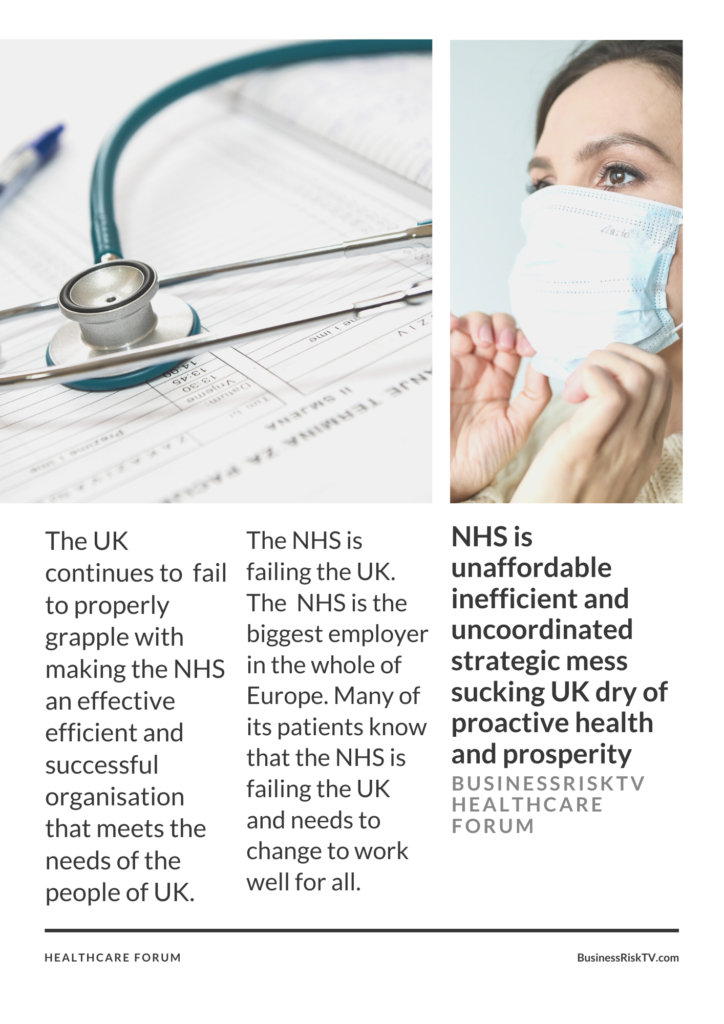
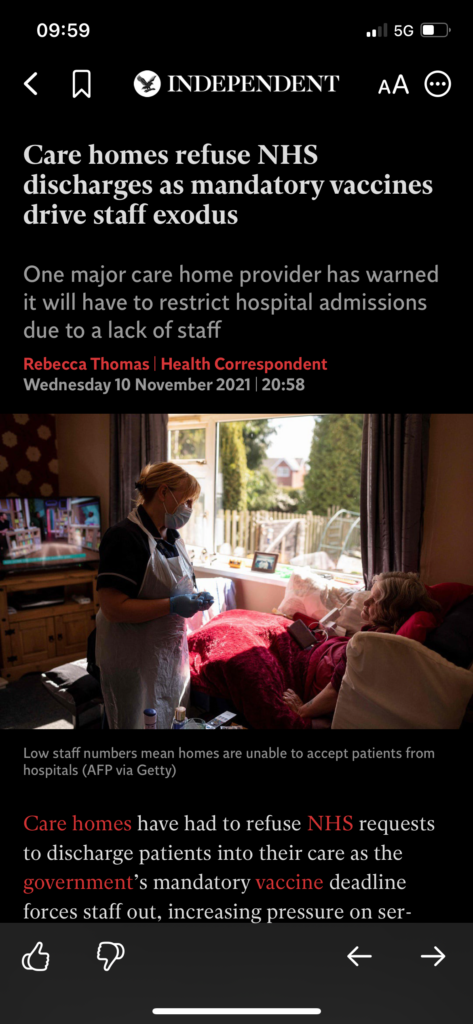
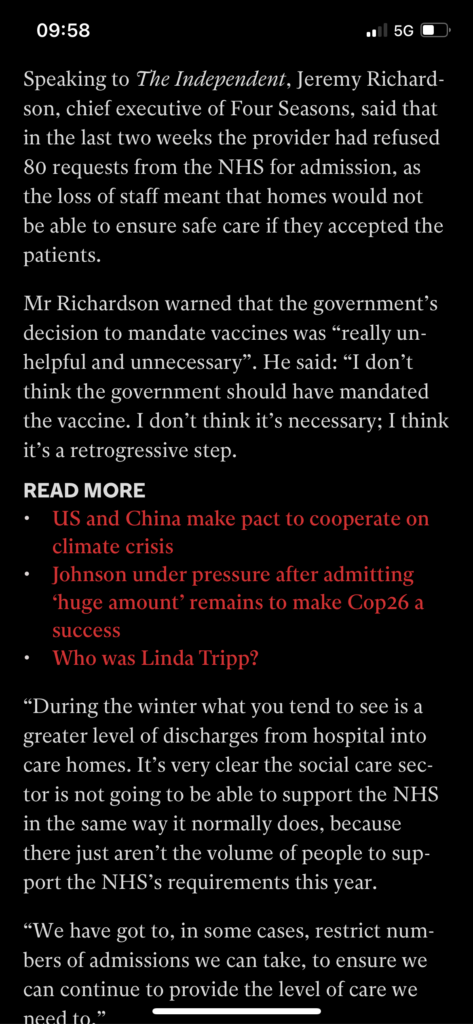
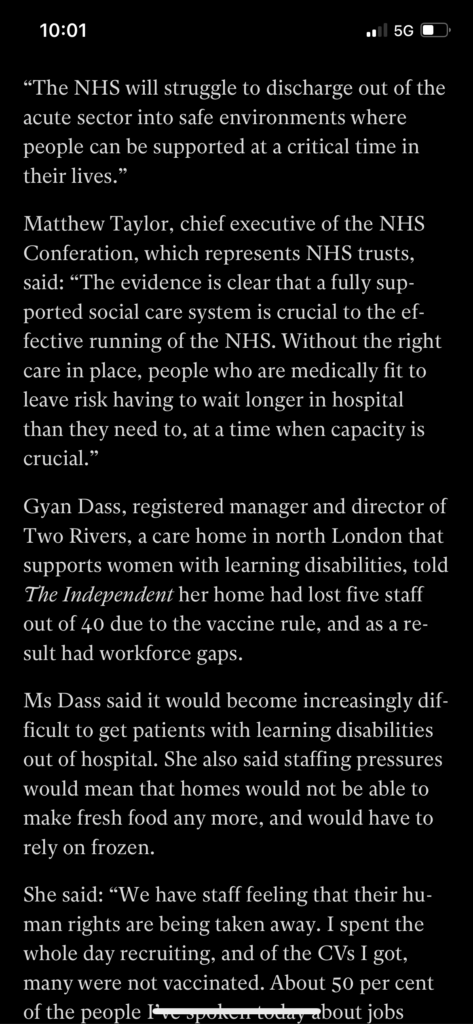
Shame of politicians and general society on treatment of healthcare workers globally
Covid-19 Vaccination Risk Analysis
Healthcare in USA
Risk To Fertility From Covid Vaccines?
Covid vaccine and pregnancy UK
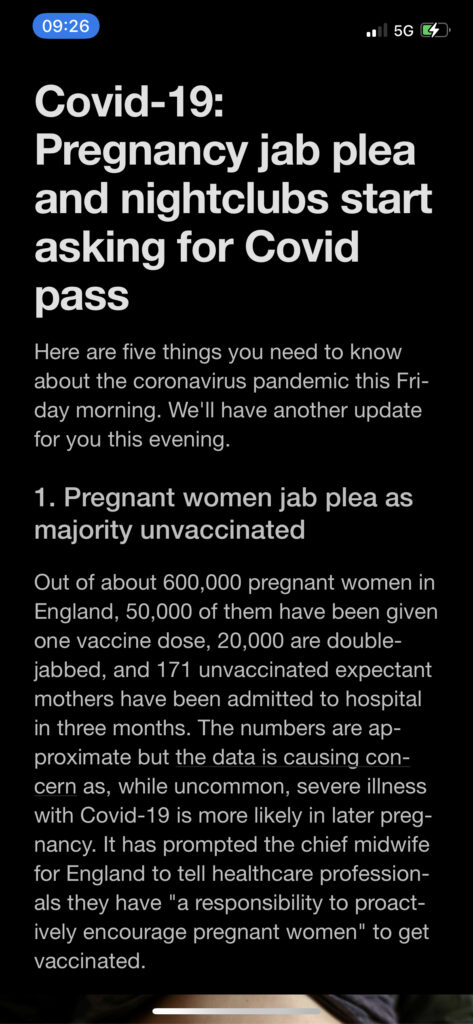
- BBC report says “171 unvaccinated expectant mothers have been admitted to hospital in three months” – we know for certain that many people admitted to hospital for other reasons than Covid have been recorded wrongly as Covid hospitalisation. Could these 171 women have been admitted for ankle injury, high blood pressure, etc and subsequently tested for Covid and upon positive test wrongly recorded as victim of Covid needing to go to hospital?
- The BBC report says the 171 figure is an estimate! Funny how an “estimate” was not rounded down? Why are exact figures not known 17 months after pandemic started – enough time to get accurate figures if you wanted.
- Why is there no mention at all of vaccinated women who could have been admitted to hospital? If there were none should this not be stated in balanced report? Given that many non-pregnant people have gone to hospital with side effects of vaccine it is likely that at least one out of 50000 women will have been admitted to hospital due to vaccine – even if just for observation? Everyone admits that like all drugs there are side effects from all vaccines in some people.
- Is it not too early for chief midwife for England to be certain about positive risk reward assessment of vaccine for pregnant women? Any woman under 40 has low risk of serious outcome if catch virus. Do we know long term effects of vaccines on anyone let alone unborn child?
- After more than 17 months of pandemic in UK, how many newborn children have suffered adverse affects from their mother catching Covid and what were these adverse effects?
- If you get the vaccine you can still catch virus! What reduction of impact on newborn baby is provided for a vaccinated pregnant mother who still catches virus?
Nurses Are Scared To Speak Out In UK
Flaw With UK NHS COVID Hospitalisation Data
NHS State Of Health September 2021
Vaccines Can Be A Force For Good and Evil
What are the biggest threats to a healthcare business?

Join our Healthcare Risk Management Forum enter code #HealthcareRisks
What are the opportunities for healthcare business growth. Network with top healthcare business leaders on BusinessRiskTV. Manage healthcare strategic and business risks better in the UK.
Read healthcare risk management articles
Pick up tips to help you tackle the challenges in healthcare business risk management.
Enter code #HealthcareBusinessMagazine

You will find related risk management articles and videos to develop your risk knowledge and business intelligence to improve your business decision making process
Register for free for healthcare industry risk management bulletins and reviews to your inbox

Promote and market your business on Healthcare Risks Forum for 12 months

Find out how to promote your business locally and globally. CLICK HERE or email editor@businessrisktv.com entering code #HealthcareMarketing
Put your healthcare products or services in front of new people already interested in your type of business offering.
Increase the sources of your revenue streams more sustainably. Grow your healthcare business faster with BusinessRiskTV.
BusinessRiskTV Healthcare Industry Business Risk Management Forum and Healthcare Business Magazine UK
Follow healthcare industry live updates and highlights. Get the latest healthcare news opinions and business risk analysis.
Help from experts and your peers to manage top risks facing healthcare organisations. Reduce healthcare business threats and seize new business opportunities. Control critical risks facing the healthcare industry. Managing risk in healthcare industry better.
UK GP Services Post Pandemic and Total Triage

GPs want to keep video consultations post pandemic but do patients?
Nine in 10 GPs want to continue with remote telephone and video consultations after the pandemic according to British Medical Association BMA survey.
On 13th May 2021 the NHS backed away from plans post pandemic to continue with 100 percent screening for GP appointments online or over the telephone. Every patient will not lose their right to see their doctor face-to-face if that is their preference. UK patients, in theory, should not be discouraged from face-to-face appointments. Every single GP practice in England has been instructed by NHS England to make “a clear offer of appointments in person” and to respect the preferences of patients.
GP practices can continue to use video, online and telephone consultations where patients find this beneficial, but GP practices must at the same time make clear an offer of appointment in person. GP practices should respect patient preference for face-to-face appointment in person.
“During the worst of the pandemic around half of all GP consultations were conducted remotely”
BusinessRiskTV
NHS England change in policy comes after widespread claims that continued total triage by GP practices was impacting on quality of healthcare deliverance and verging on impossibility of seeing your doctor face-to-face. Plans for mandatory remote assessment for 100 percent of cases by GP practices must now be scrapped. GPs must stop deterring patients from visiting the practice.
Healthcare risk consulting and healthcare risk management training
Healthcare risk management capability report healthcare risk management training services and healthcare products and services deals discounts and special offers.
Protect your organisation with tailored healthcare risk management consulting. Subscribe to receive latest news opinions and reviews on healthcare business enterprise risk management HERM.
BusinessRiskTV Healthcare Risk Management Solutions are designed to meet the needs of healthcare businesses in the UK. Strategic operational and project risk assessment tips advice and support. Book healthcare enterprise risk management ERM training for healthcare professionals executives and senior management teams.

Healthcare Enterprise Risk Management Training Courses enter code #HealthcareRisks
Healthcare product and service providers promoting their deals discounts and special offers
Let more people know about your healthcare products and services promotions. Sell more healthcare products and services more profitably online. Find solutions to your healthcare business problems.
- Want to list your business in our Healthcare Business Directory?
- Are you running any healthcare deals discounts or special offers you want more people to know about?
- Could you write an advertorial to advertise your healthcare products or services and inform our readers?
Reach more new customers with BusinessRiskTV.
Read more enterprise risk management articles and watch videostreaming live and ondemand for free
BusinessRiskTV Healthcare Industry TV
#BusinessRiskTV #Healthcare #HealthcareForum #HealthcareRisks #HealthcareBusinessMagazine #HealthcareRiskManagementMagazine #HealthcareRisksForum #HealthcareRiskManagement #NHS #NHSriskmanagement #SocialCare #Nursing #Hospitals #SocialCareRisks #HealthcareMarketing #HealthcareBusinessNewsMagazine
Healthcare Risk Management Magazine BusinessRiskTV Healthcare Business Magazine
